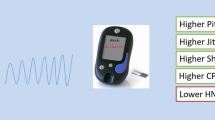Abstract
Objective: Thyroid hormone deficiency may affect human speech and voice. The aim of this study was to e-valuate speech variables in patients with hypothyroidism. Design: A case control study. Patients: One hundred and twenty patients, 106 women and 14 men with symptoms and signs of thyroid failure; the diagnosis was confirmed by serum T4<4.5 μg/dl and serum TSH>10 mU/l. Eighty-eight normal subjects, 78 women and 10 men, age-, sex-, and smoking status-matched, served as controls. Measurements: All symptoms and signs of hypothyroidism were recorded. Serum T4, T3, and TSH concentrations were measured. Speech parameters were analyzed by the Visipitch III system model 3900 and multidimensional voice program software and compared to a group of normal subjects with no thyroid disease. Results: Mean age was 35.9±11.4 yr. Dryness in larynx and pharynx, dyspnea, and sensation of lump in the throat were reported by 53.49 and 43% of patients, respectively. Fundamental frequency, voice turbulence index, and soft phonation index were significantly different from control values. There was positive correlation between TSH concentration and variation in fundamental frequency and prevalence of voice disorders (37.2±31.2 vs 23.9±25.8 mU/l, p<0.003). Conclusion: Frequent speech disturbances occur in patients with primary hypothyroidism.
Similar content being viewed by others
References
Koufman JA, Isaacson G. The spectrum of vocal dysfunction. Otolaryngo Clin North Am 1991, 24: 985–8.
Kent RD, Vorperian HK, Duffy JR. Reliability of the multi-dimensional voice program for the analysis of voice samples of subjects with dysarthria. Am J Speech Lang Pathol 1999, 8: 129–36.
Stöllberger C, Finsterer J, Brand E, Tschabitscher D. Dysarthria as the leading symptom of hypothyroidism. Am J Otolaryngology 2001, 22: 70–2.
Ritter FN. The effects of hypothyroidism upon the ear nose and throat. A clinical and experimental study. Laryngoscope 1967, 77: 1427–79.
Djrolo F, Houngbé F, Attolou V, Hountondji B, Quenum K, Hountondji A. Hypothyroidism: Clinical and etiological aspects in Cotonou (Republic of Benin). Sante 2001, 11: 245–9.
Bicknell PG. Mild hypothyroidism and its effects on the larynx. J Laryngol Otol 1973, 87: 123–7.
Gottschalk B, Richman RA, Lewandowski L. Subtle speech and motor deficits of children with congenital hypothyroid treated early. Dev Med Child Neurol 1994, 36: 216–20.
Rovet JF, Ehrlich RM, Sorbara DL. Neurodevelopment in infants and preschool children with congenital hypothyroidism: etiological and treatment factors affecting outcome. J Pediatr Psychol 1992, 17: 187–213.
Azizi F, Sarshar A, Nafarabadi M, et al. Impairment of neuromotor and cognitive development in iodine-deficient schoolchildren with normal physical growth. Acta Endocrinol 1993, 129: 501–4.
Rovet J, Walker W, Bliss B, Buchanan L, Ehrlich R. Long-term sequelae of hearing impairment in congenital hypothyroidism. J Pediatr 1996, 128: 776–83.
Barton EN, Kelly D, Morrison EY. A retrospective study on hypothyroid patients. West Indian Med J 1991, 40: 26–8.
Altman KW, Haines GK 3rd, Vakkalanka SK, Keni SP, Kopp PA, Radosevich JA. Identification of thyroid hormone receptors in the human larynx. Laryngoscope 2003, 113: 1931–4.
Carding PN, Roulstone S, Northstone K; ALSPAC Study Team. The prevalence of childhood dysphonia: a cross-sectional study. J Voice 2006, 20: 623–30.
Barton RT. Pharyngeal and laryngeal symptoms of thyroid origin. N EnglJ Med 1951, 244: 398–9.
Ficarra BJ. Myxedematous hoarseness. Arch Otolaryngol 1960, 72: 75–6.
Gupta OP, Bhatia PL, Agarwal MK, Mehrotra ML, Mishr SK. Nasal, pharyngeal, and laryngeal manifestations of hypothyroidism. Ear Nose Throat J 1977, 56: 349–56.
Author information
Authors and Affiliations
Corresponding author
Rights and permissions
About this article
Cite this article
Mohammadzadeh, A., Heydari, E. & Azizi, F. Speech impairment in primary hypothyroidism. J Endocrinol Invest 34, 431–433 (2011). https://doi.org/10.1007/BF03346708
Published:
Issue Date:
DOI: https://doi.org/10.1007/BF03346708




